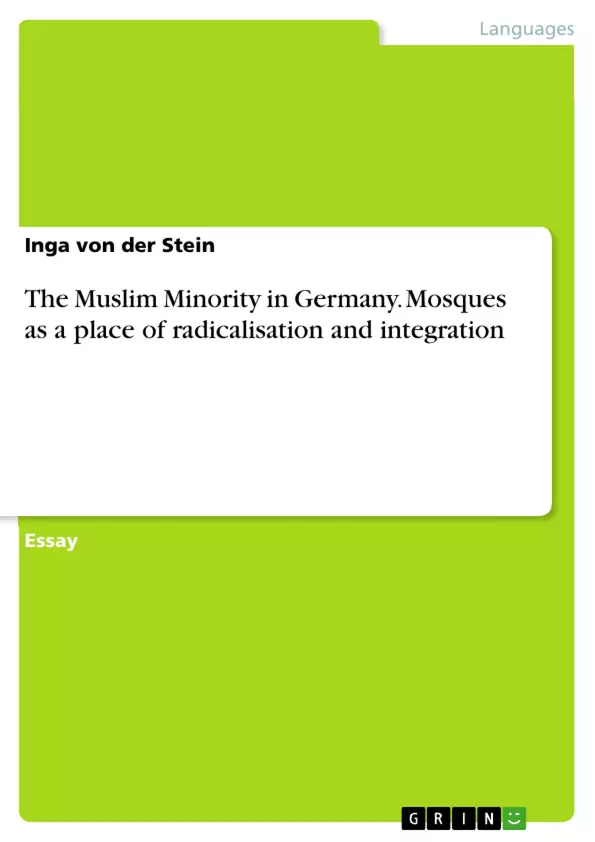On the 19th December 2016, Tunisian national Anis Amri drove deliberately with a hijacked truck into the Christmas Market at the Breitscheidplatz in Berlin, killing 12 and injuring more than 50 people. In the morning he had been visiting the Mosque Fussilet 33, which according to the police was a meeting point for Islamists. The terror attack triggered a public outcry and led to an increasing securitisation of Islam in public debates. Mosques as a contact point - both for Muslims in Germany and for those which come as migrants - thus form a special point of interest to be able to understand which values and beliefs influence Muslims in Germany.
To this end, this paper investigates the potential of Mosques for both radicalisation and integration. It firstly analyses the factors that facilitate radicalisation, and secondly offers ideas on how to use mosques for integration, particularly pointing out the special responsibility of Imams. To offer a well-balanced analysis, this paper employs quantitative sources such as official data by the Ministry of Migration and Refugees and qualitative sources including speeches held at the German Islamic Conference and the work of Islamic Studies scholars.
This paper argues that Mosques are of great influence as they form a contact point for Muslims in Germany and offer guidelines and lifestyle advice. Mosques thus have great potential: as a place for radicalisation but also as a place for integration. Mosques can be used by Salafists and radical returnees from fighting to promote a radical agenda. To use the ‘positive’ potential for integration, the role of the imam is of particular significance, here it is essential that the imam is integrated both into his home and host society, in order to function as a bridge.
Furthermore, the potential of women has to be further expanded, to enable them to take on more active roles in shaping the community. This paper is structured as followed: firstly, an overview is given on the emergence of Islam in Germany, the organisation and the role of Mosques and the function of Imams. In the analytical section, the potential for radicalisation is first explored, followed by an outline of the potential for integration, including ideas of how to fully use this positive potential.
Inhaltsverzeichnis (Table of Contents)
- INTRODUCTION
- BACKGROUND
- Islam in Germany
- MOSQUES AS A SPHERE OF RADICALISATION.
- MOSQUES AS A SPHERE OF INTEGRATION..
- CONCLUSION
Zielsetzung und Themenschwerpunkte (Objectives and Key Themes)
This paper aims to investigate the potential of mosques in Germany for both radicalization and integration. It analyzes the factors that facilitate radicalization and explores ways to utilize mosques for fostering integration, particularly highlighting the role of imams. The paper draws on both quantitative data from official sources and qualitative insights from speeches and academic works.
- The emergence of Islam in Germany and the role of mosques in shaping Muslim communities.
- The potential for radicalization within mosques.
- The potential for integration through mosques, emphasizing the importance of imams and women's roles.
- The influence of mosques on Muslim identity and values in Germany.
Zusammenfassung der Kapitel (Chapter Summaries)
- INTRODUCTION: This section provides a context for the study, highlighting the events that led to heightened public concern about the role of mosques in Germany. It establishes the paper's focus on exploring the potential of mosques for both radicalization and integration.
- BACKGROUND: This chapter examines the historical development of Islam in Germany, tracing its origins from labor migration and subsequent waves of refugees. The chapter provides statistics on the Muslim population in Germany and analyzes the changing demographics of Muslim communities.
- MOSQUES AS A SPHERE OF RADICALISATION: This chapter delves into the factors that facilitate radicalization within mosques, exploring potential risks and vulnerabilities. It analyzes the influence of extremist ideologies and the role of mosques in shaping the views and behaviors of some individuals.
- MOSQUES AS A SPHERE OF INTEGRATION: This chapter focuses on the positive potential of mosques for promoting integration within German society. It highlights the role of imams in bridging cultural gaps and fostering community cohesion. The chapter also emphasizes the importance of empowering women to play a more active role in shaping Muslim communities.
Schlüsselwörter (Keywords)
Key themes and concepts explored in the paper include Islam in Germany, mosques, radicalization, integration, imams, women's roles, Muslim identity, and cultural diversity.
Frequently Asked Questions
What is the central focus of this research paper on mosques in Germany?
The paper investigates the dual potential of mosques in Germany as places for both radicalization and social integration, especially following events like the 2016 Berlin Christmas market attack.
How can mosques facilitate the integration of Muslims into German society?
Mosques serve as contact points that offer guidance and community. Imams play a crucial role by acting as bridges between the home and host societies, provided they are well-integrated themselves.
What factors contribute to radicalization within some mosques?
The paper explores how extremist ideologies, such as Salafism, can use mosques to promote a radical agenda, often targeting vulnerable individuals or returnees from conflict zones.
Why is the role of imams considered so significant?
Imams are spiritual leaders whose influence shapes community values. Their ability to function as cultural mediators is essential for fostering positive integration and preventing radical tendencies.
What role do women play in the development of Muslim communities in Germany?
The paper argues for expanding the potential of women, enabling them to take on more active roles in shaping community life and contributing to the integration process.
- Quote paper
- Inga von der Stein (Author), 2017, The Muslim Minority in Germany. Mosques as a place of radicalisation and integration, Munich, GRIN Verlag, https://www.grin.com/document/435457



